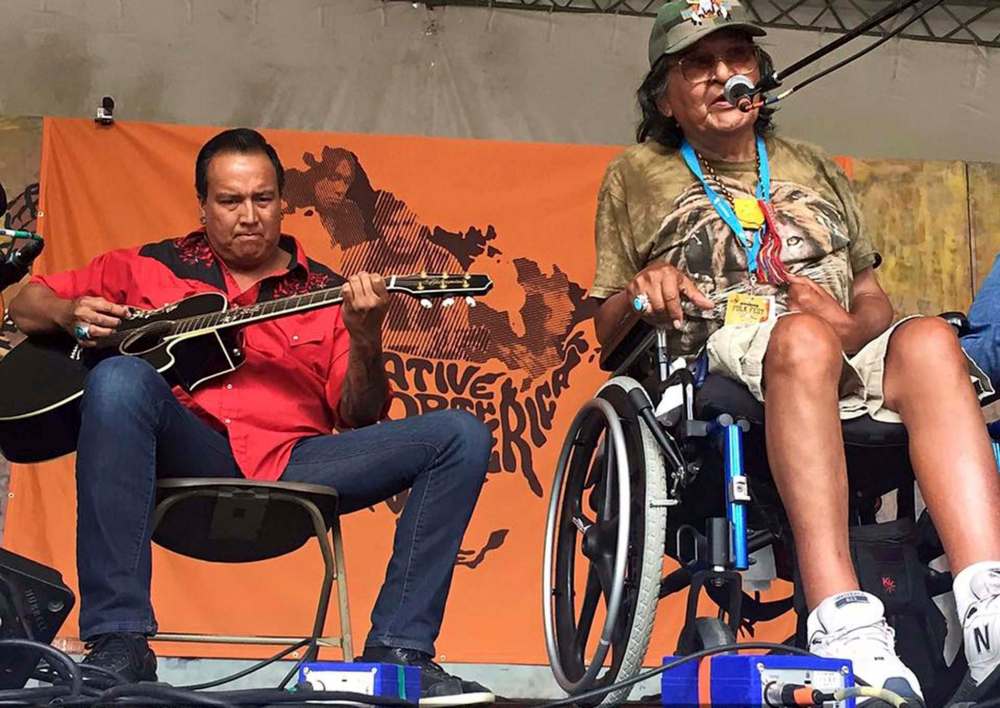Indigenous performer was a musical trailblazer
Local singer, producer a tireless promoter of Aboriginal acts
Advertisement
Read this article for free:
or
Already have an account? Log in here »
To continue reading, please subscribe:
Monthly Digital Subscription
$0 for the first 4 weeks*
- Enjoy unlimited reading on winnipegfreepress.com
- Read the E-Edition, our digital replica newspaper
- Access News Break, our award-winning app
- Play interactive puzzles
*No charge for 4 weeks then price increases to the regular rate of $19.00 plus GST every four weeks. Offer available to new and qualified returning subscribers only. Cancel any time.
Monthly Digital Subscription
$4.75/week*
- Enjoy unlimited reading on winnipegfreepress.com
- Read the E-Edition, our digital replica newspaper
- Access News Break, our award-winning app
- Play interactive puzzles
*Billed as $19 plus GST every four weeks. Cancel any time.
To continue reading, please subscribe:
Add Free Press access to your Brandon Sun subscription for only an additional
$1 for the first 4 weeks*
*Your next subscription payment will increase by $1.00 and you will be charged $16.99 plus GST for four weeks. After four weeks, your payment will increase to $23.99 plus GST every four weeks.
Read unlimited articles for free today:
or
Already have an account? Log in here »
Hey there, time traveller!
This article was published 13/01/2021 (1792 days ago), so information in it may no longer be current.
Shingoose, a Indigenous musician from Winnipeg who was part of the 1960s folk movement in New York and would later become a producer and mentor to others in entertainment in Winnipeg, died Tuesday morning of COVID-19 complications. He was 74.
He had contracted COVID-19 at the Southeast Personal Care Home, said his daughter, Nahanni Shingoose, but he told her in a phone conversation Jan. 7 that he thought he was getting over it.
“He was supposed to be getting better. He had a fever for three days, he said, and he called and said he had COVID and was feeling better,” Nahanni Shingoose said from Toronto. “On Saturday, he didn’t answer his phone.”

The performer was born Curtis Jonnie in 1946 at Roseau River First Nation. By 1965 he’d made his way to Washington, D.C., where he joined a band called Puzzle that landed a deal with ABC Records. It was during this time, when the band moved to New York, when he would brush shoulders with rock legends such as Jimi Hendrix and John Lennon during recording sessions and gatherings of friends and fellow musicians.
Puzzle broke up and eventually Jonnie made his way to Toronto, where he began performing as a solo act at coffee houses. It was there he took on the name Shingoose, his grandfather’s name before Indian agents changed their family members’ names, Nahanni Shingoose said.
In 1973 he met Duke Redbird, an Aboriginal artist from Ontario, and in 1976 they recorded the EP Native Country, accompanied by a young Bruce Cockburn.
Shingoose returned to Winnipeg in 1981 and began focusing on promoting Aboriginal performers. That would lead to Indian Time, a series of variety television specials he produced and starred in that highlighted Indigenous acts and won a Gemini Award.
In 1994, he would join with Canadian folksinger Buffy Sainte-Marie and songwriter Elaine Bomberry to create the Juno Awards’ Aboriginal Music Committee in 1994, which led to the creation of the Junos’ Indigenous Album of the Year category.
His music with Redbird returned to prominence in 2016 after one of their songs, Silver River, was included in Native North America Vol. 1 — Aboriginal Folk, Rock, and Country 1966-1985, a Grammy Award-nominated anthology of songs by Indigenous artists. That same year, he performed the song at the Winnipeg Folk Festival, an event he loved, his family says, as part of a workshop that showcased songs from the record.
Shingoose suffered a stroke in 2012 that paralyzed the left side of his body, but that didn’t stop him from coming up with ideas to promote Indigenous artists, said David McLeod, general manager of NCI and a vice-chair of APTN.
Clay Hage, Shingoose’s half-brother, who grew up in North Dakota, crossed paths with Shingoose countless times when the singer was on tour. He remembered how determined Shingoose was to have a musical career, and later to promote other entertainment ideas.
“What a great talent Curt was, to have done so many things with that talent, travelling to the United States and Europe, but never getting that one big break,” he said in a telephone call from Moreno Valley, Calif. “He was always pursuing that one big break. He was the eternal optimist, always.”
alan.small@freepress.mb.ca
Twitter:@AlanDSmall

Alan Small has been a journalist at the Free Press for more than 22 years in a variety of roles, the latest being a reporter in the Arts and Life section.
Our newsroom depends on a growing audience of readers to power our journalism. If you are not a paid reader, please consider becoming a subscriber.
Our newsroom depends on its audience of readers to power our journalism. Thank you for your support.


